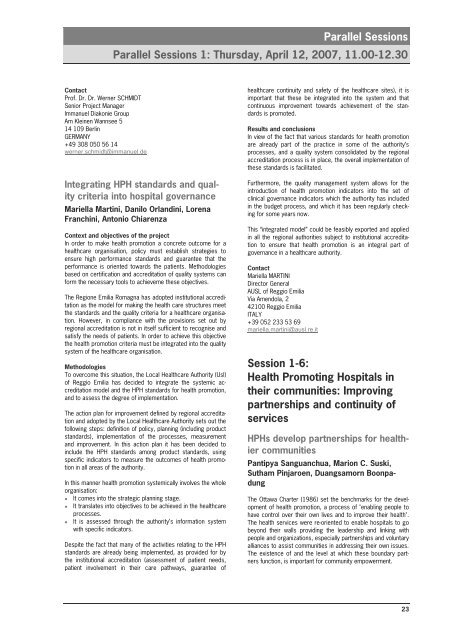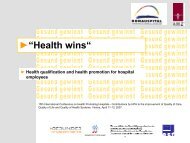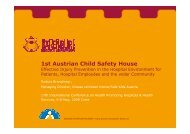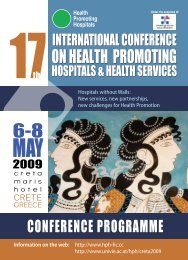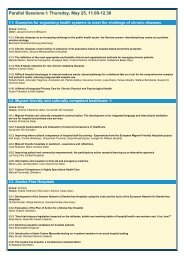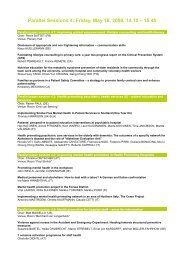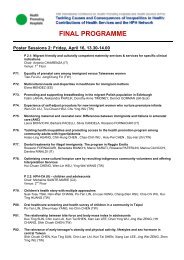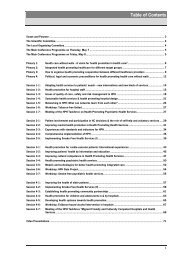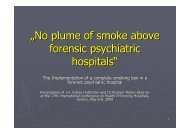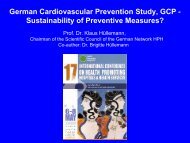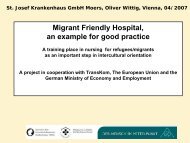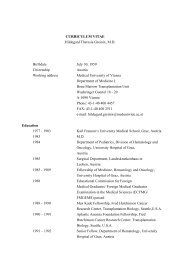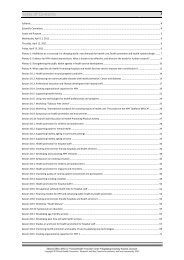Plenary 1: The Hospital – A Staff Empowering ... - HPH-Conference
Plenary 1: The Hospital – A Staff Empowering ... - HPH-Conference
Plenary 1: The Hospital – A Staff Empowering ... - HPH-Conference
You also want an ePaper? Increase the reach of your titles
YUMPU automatically turns print PDFs into web optimized ePapers that Google loves.
Contact<br />
Prof. Dr. Dr. Werner SCHMIDT<br />
Senior Project Manager<br />
Immanuel Diakonie Group<br />
Am Kleinen Wannsee 5<br />
14 109 Berlin<br />
GERMANY<br />
+49 308 050 56 14<br />
werner.schmidt@immanuel.de<br />
Parallel Sessions<br />
Parallel Sessions 1: Thursday, April 12, 2007, 11.00-12.30<br />
Integrating <strong>HPH</strong> standards and quality<br />
criteria into hospital governance<br />
Mariella Martini, Danilo Orlandini, Lorena<br />
Franchini, Antonio Chiarenza<br />
Context and objectives of the project<br />
In order to make health promotion a concrete outcome for a<br />
healthcare organisation, policy must establish strategies to<br />
ensure high performance standards and guarantee that the<br />
performance is oriented towards the patients. Methodologies<br />
based on certification and accreditation of quality systems can<br />
form the necessary tools to achieveme these objectives.<br />
<strong>The</strong> Regione Emilia Romagna has adopted institutional accreditation<br />
as the model for making the health care structures meet<br />
the standards and the quality criteria for a healthcare organisation.<br />
However, in compliance with the provisions set out by<br />
regional accreditation is not in itself sufficient to recognise and<br />
satisfy the needs of patients. In order to achieve this objective<br />
the health promotion criteria must be integrated into the quality<br />
system of the healthcare organisation.<br />
Methodologies<br />
To overcome this situation, the Local Healthcare Authority (Usl)<br />
of Reggio Emilia has decided to integrate the systemic accreditation<br />
model and the <strong>HPH</strong> standards for health promotion,<br />
and to assess the degree of implementation.<br />
<strong>The</strong> action plan for improvement defined by regional accreditation<br />
and adopted by the Local Healthcare Authority sets out the<br />
following steps: definition of policy, planning (including product<br />
standards), implementation of the processes, measurement<br />
and improvement. In this action plan it has been decided to<br />
include the <strong>HPH</strong> standards among product standards, using<br />
specific indicators to measure the outcomes of health promotion<br />
in all areas of the authority.<br />
In this manner health promotion systemically involves the whole<br />
organisation:<br />
� It comes into the strategic planning stage.<br />
� It translates into objectives to be achieved in the healthcare<br />
processes.<br />
� It is assessed through the authority’s information system<br />
with specific indicators.<br />
Despite the fact that many of the activities relating to the <strong>HPH</strong><br />
standards are already being implemented, as provided for by<br />
the institutional accreditation (assessment of patient needs,<br />
patient involvement in their care pathways, guarantee of<br />
healthcare continuity and safety of the healthcare sites), it is<br />
important that these be integrated into the system and that<br />
continuous improvement towards achievement of the standards<br />
is promoted.<br />
Results and conclusions<br />
In view of the fact that various standards for health promotion<br />
are already part of the practice in some of the authority’s<br />
processes, and a quality system consolidated by the regional<br />
accreditation process is in place, the overall implementation of<br />
these standards is facilitated.<br />
Furthermore, the quality management system allows for the<br />
introduction of health promotion indicators into the set of<br />
clinical governance indicators which the authority has included<br />
in the budget process, and which it has been regularly checking<br />
for some years now.<br />
This “integrated model” could be feasibly exported and applied<br />
in all the regional authorities subject to institutional accreditation<br />
to ensure that health promotion is an integral part of<br />
governance in a healthcare authority.<br />
Contact<br />
Mariella MARTINI<br />
Director General<br />
AUSL of Reggio Emilia<br />
Via Amendola, 2<br />
42100 Reggio Emilia<br />
ITALY<br />
+39 052 233 53 69<br />
mariella.martini@ausl.re.it<br />
Session 1-6:<br />
Health Promoting <strong>Hospital</strong>s in<br />
their communities: Improving<br />
partnerships and continuity of<br />
services<br />
<strong>HPH</strong>s develop partnerships for healthier<br />
communities<br />
Pantipya Sanguanchua, Marion C. Suski,<br />
Sutham Pinjaroen, Duangsamorn Boonpadung<br />
<strong>The</strong> Ottawa Charter (1986) set the benchmarks for the development<br />
of health promotion, a process of "enabling people to<br />
have control over their own lives and to improve their health".<br />
<strong>The</strong> health services were re-oriented to enable hospitals to go<br />
beyond their walls providing the leadership and linking with<br />
people and organizations, especially partnerships and voluntary<br />
alliances to assist communities in addressing their own issues.<br />
<strong>The</strong> existence of and the level at which these boundary partners<br />
function, is important for community empowerment.<br />
23


